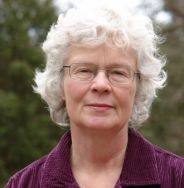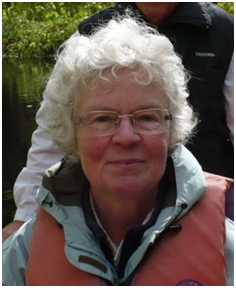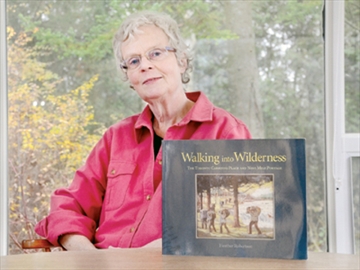 Heather Margaret Robertson will go down in Canadian history as the representative plaintiff in, and driving force behind, two class action suits that set a precedent in protecting the rights of freelance writers. The legacy she leaves us, following her death on March 19th, her 72nd birthday, is multi-layered. It includes not just the 16 or more books she wrote, grounded in cultural and geographic history, and her prolific writing for major newspapers, magazines and CBC-radio work. Her legacy, moreover, resides in her generosity to fellow writers throughout her professional life.
Heather Margaret Robertson will go down in Canadian history as the representative plaintiff in, and driving force behind, two class action suits that set a precedent in protecting the rights of freelance writers. The legacy she leaves us, following her death on March 19th, her 72nd birthday, is multi-layered. It includes not just the 16 or more books she wrote, grounded in cultural and geographic history, and her prolific writing for major newspapers, magazines and CBC-radio work. Her legacy, moreover, resides in her generosity to fellow writers throughout her professional life.
Her accomplishments speak for themselves. But, who was Heather Robertson, the person? The deeper questions to ponder are, how and why do certain individuals become standard bearers, manifesting qualities that can teach us about what really matters?
Individuals such as Heather Robertson – who focus on the larger good rather than their own success, and who choose privacy and personal dignity over blowing their own horns endlessly – are those heroines (and heroes) who too often depart this world unheralded altogether, or without being appropriately recognized in the national news media.
Close to two weeks after Heather’s life ended, locating mainstream news sources which paid attention to the loss of one of Canada’s most courageous writers has been a challenge.
Those omissions perhaps do not matter to the departed individual. What I suggest, however, is that they are our loss, collectively as a society, and individually at a soul level. How do we rise to who we can be, without examples of authentic heroism? Where do we learn about those individuals who fought the battles that had looked impossible, and won?
The most well-known public battles, which Heather took on with fierceness and tenacity, were the legal fights against huge media corporations in two class action law suits that she led. In doing so, she won millions of dollars to benefit hundreds of freelance writers.
These cases included Robertson v Thomson (which went to the Supreme Court of Canada), followed by a second class action settled out of court, and popularly known as Robertson 2, in which she took on several other large media corporations together. The issue was the reproduction of freelance writers’ published work on electronic databases – for corporate owners’ profit – without permission or reimbursement to the original authors.
These two battles continued through 15 years of her life. Think about it.
As her close friend Elaine Dewar identified, in a recent phone conversation, to do so called upon Heather’s inner resources of “courage, grit and all kinds of patience. There were lots of points where we didn’t know whether we’d win or not, and it was a constant source of worry for Heather.”
recent phone conversation, to do so called upon Heather’s inner resources of “courage, grit and all kinds of patience. There were lots of points where we didn’t know whether we’d win or not, and it was a constant source of worry for Heather.”
I had a glimpse of the stamina and endurance required by Heather to get through the tedium, the uncertainty, not to mention the offensive arguments from the Thomson corporation’s army of lawyers. They exhibited a willful ignorance in regard to how the electronic database exploitation violated, and undermined, the ability of writers to earn a decent livelihood.
For I sat in the court room every day of that first legal case, in a row further back, watching, listening, and consciously giving my energetic presence to support Heather. She never forgot, and expressed her gratitude in our occasional future encounters.
Important to mention is that her two stalwart friends, and fellow award-winning writers – Elaine Dewar and June Callwood – also were present. They sat on each side of Heather every day in that court room, and stood by her through everything.
The victories, by the way, won against these media corporations, was not simply about money. For Heather Robertson, winning was about the principles of fairness and giving respect. Heather’s own compensation from Robertson v Thomson was a mere $5,000.
This revelation is given on Slaw, Canada’s online legal magazine, in a blog post by lawyer Simon Chester, a few days after Heather’s passing. He also praises her diligence as a highly informed and proactive plaintiff.
Regrettably, neither The Globe and Mail nor The Toronto Star have yet shown the courtesy to provide any journalistic acknowledgment of Heather’s passing, to date.
Among the few news sources that were quick to do so The Winnipeg Free Press was the first. Indeed, this newspaper is where Heather began her vocation as a professional journalist. CBC-Radio One’s program As It Happens acknowledged her passing later the same day.
Where she and her husband Andrew Marshall have lived for many years, King Township, Ontario, the local York Region news also acknowledged it. A previous York Region interview with Heather, in 2012, more descriptively revealed her passion for history, and her years of local volunteerism to promote interest in it.
“Firebrand” – the title saying it all – is an outstanding feature interview with Heather Robertson, published in the Ryerson Review of Journalism‘s Winter 2012 edition. Regan Reid’s article gifts us with chronological highlights from her life, that help us understand Heather’s strong character and early influences that shaped her life’s pursuits.
To honour Heather in my own bricolage of gathered facts about who she was more fully as a person, I also have inserted three photographs. The first photo (above) shows Heather more formally, elegant yet reserved. The second photo brings a smile to my face; for I see a sparkle in her gaze, a glimmer of the inner person, relaxed and joyful in natural settings. The third photo (below) shows Heather’s grace and dignity, despite the affliction of cancer.
I also have inserted three photographs. The first photo (above) shows Heather more formally, elegant yet reserved. The second photo brings a smile to my face; for I see a sparkle in her gaze, a glimmer of the inner person, relaxed and joyful in natural settings. The third photo (below) shows Heather’s grace and dignity, despite the affliction of cancer.
A lot of detective work was needed, to cobble together Heather’s extensive achievements, and to discover the many awards. Even the Wikipedia entry does not name all of them.
One award missing on Wiki, for example, is the 2011 NMA Foundation Award for Outstanding Achievement, bestowed on Heather by the National Magazine Awards Foundation. Its online awards page for her includes a list of accolades from fellow writers.
Heather also was honoured by fellow writers in receiving the 2011 Graeme Gibson Award from The Writers’ Union of Canada (TWUC), and the 2003 Lawrence Jackson Outstanding Achievement Award from the Professional Writers Association of Canada (PWAC), formerly called Periodical Writers Association of Canada). She was a founding member of both national writers’ organizations.
Heather generously gave her time to many individual writers, including me 25 years ago. That’s why I was there for her in that court room. And, yes, I was fortunate to be one of the hundreds of freelance writers who benefited financially from both class action suits.
She also graciously accepted my invitation to participate in one of several public forums that I organized on media literacy at Toronto’s St. Lawrence Centre Forum in the 1990s.
That public forum “Is Diversity of Expression Under Siege by New Technologies?,” sponsored by PWAC, was moderated by then Metro Morning, CBC-radio host Andy Barrie. The Forum panelists included Heather, veteran journalist Doris Anderson, internet expert Jim Carroll, and Even Solomon, then an expert in new media and social impact, one of CBC Newsworld‘s news anchors, and current host of “Power and Politics.”
A few days ago, yet another recognition of Heather Robertson’s life appeared in The Winnipeg Free Press (WFP), which speaks to why she received awards from fellow writers (on top of a number of book awards). The fact that respect does come full circle is evident by Gordon Sinclair, Jr.’s WFP article titled “Writer’s best legacy: respect for her peers.”
Mr. Sinclair’s article is deeply touching; for he relates some details from her early life, her noteworthy feisty spirit, a spirit that nourished Heather’s capacity to survive through a series of cancers in the later years.
Remarkably, given these very private battles, Heather produced one more book, titled Walking into Wilderness: The Toronto Carrying Place and Nine Mile Portage (2010). It received an unusual award, the first of a new Speakers Book Award, established in 2013 by Ontario Legislative Speaker Dave Levac.
Heather’s passing in her sleep may appear to be sudden and unexpected. Yet, given the battles that she had fought so courageously for so long, perhaps the still, small voice within said: “It’s time, Heather. You have done enough. Be at peace now.”
She departed this world without fanfare, without further suffering, yet with her dignity intact. She did it her way.
God bless you, Heather, for everything you were and everything you contributed in this earthly world. We will not forget.
PHOTO CREDIT: (top photo only) Aaron Marshall
POSTSCRIPT: Finally, on April 3rd online (April 4th, print edition), a feature obituary appeared in The Globe and Mail, contributed by freelance journalist David Hayes.


very moving tribute about a great Canadian and human being
Thank you, Marion, for appreciating Heather Robertson’s legacy.
I hope many more Canadians learn about her cultural contributions.
Thanks for expressing what we who knew, or knew of Heather Robertson, all feel.
Thanks so much, Leslie.
Terrific to hear from a fellow writer.
Thanks for this touching tribute, Sandy. Heather certainly made great and long-lasting sacrifices on behalf of us all. She will be remembered, at the very least, by Canada’s writing community.